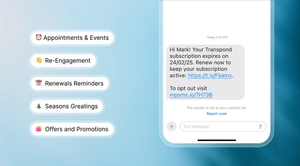Do you know what your employees are up to? Are they achieving their goals for both the company and their career?
If you need to know for sure what the answer is, performance management could help.
Performance management tools provide valuable insights into employee engagement, productivity, and overall job satisfaction. They can also help to identify areas for improvement and support employee development.
Choosing an effective performance management system is difficult - the right tool can impact your company's success, and the wrong one can cause frustration.
When each performance management system seems so similar, what should you choose?
We'll review the top performance management tools and provide practical information on key features, implementation strategies, and benefits.
What are performance management tools?
Organizations use performance management tools to optimize the evaluation of employee performance. These tools often help to clarify and simplify the evaluation process – which can be complex and subjective, particularly in large organizations.
However, even in small organizations, performance management can be challenging because of limited resources, no training, or inconsistent practices.
Performance management tools can help address these challenges by standardizing employee management and supporting effective communication between employees and managers. There are more advantages, and we’ve listed them here:
Benefits of using employee performance management tools
While performance management tools may add complexity to your HR processes (at least at first), their benefits outweigh any disadvantages: .
- Improved alignment: Individual goals and team objectives can be aligned throughout the review cycle.
- Enhanced productivity: Performance management solutions enable you to identify performance gaps and implement actionable strategies.
- Data-driven decisions: Track performance management data while rewarding top contributors and addressing underperformance.
- Continuous improvement: You can help employees grow by offering clear feedback on strengths and areas for development.
- Increased engagement: Employees can be motivated by recognition of achievements and constructive feedback.
Performance management software helps you monitor individual contributions while supporting company-wide success.
Top performance management software features to look out for
The ideal performance management solution doesn't exist as a one-size-fits-all package. Instead, it's a combination of features for your specific needs.
However, you should always keep an eye out for a couple of features:
Goal setting and tracking
Don't settle for a tool that just tracks goals. Look for one that helps you set and track SMART marketing goals (Specific, Measurable, Achievable, Relevant, and Time-bound), KPIs, and OKRs. The best tools will let you customize your metrics to align with your company's goals.
Continuous feedback and check-ins
Any peformance management tools directly links employees and managers. It provides a platform for ongoing communication, facilitating regular check-ins and real-time employee feedback.
Performance appraisals and reviews
Don't limit yourself to traditional annual reviews. Any performance management tool offers numerous evaluation methods, including self-assessments and regular performance reports.
You should be able to customize the review cycles (e.g., monthly, quarterly, annual reviews) and choose from various review formats to evaluate employee performance in different ways.
360-degree feedback
Any performance management software tool should gather ongoing feedback from multiple sources to holistically understand employee performance. This involves collecting input from peers, managers, team members, and customers.
Employee development and learning plans
Good performance management tools should help you to create individual development plans for each employee. These plans serve as roadmaps to guide employees toward skill development and career advancement.
For example, look for software that integrates with learning management systems (LMS) to support ongoing learning and development for your team.
Automated notifications and reminders
A performance management system that’s too complex and time-consuming is more of a burden than a benefit. What’s worse than a tool that hinders employee development and engagement instead of improving it?
The system should automatically notify employees about upcoming reviews, check-ins, and goal updates. Keeping everyone on the same page will ensure that deadlines aren’t missed and all tasks are completed.
Integration capabilities
Solid performance management tools integrate easily with other HR and business platforms like:
- HRIS and payroll tools
- communication platforms like Slack and Microsoft Teams
- productivity tools like time trackers and project management apps.
These integrations help manage performance efficiently and keep employee data accurate in your company performance reports.
Customizable templates and workflows
Effective performance management systems provide ready-to-use templates for feedback, reviews, development plans, and goal setting, saving time when building your performance management processes from scratch.
Analytics and reporting
One of the critical advantages of performance management tools is the ability to track and review your entire performance management strategy. Reports and dashboards provide insight into KPIs and metrics on an individual and organizational basis.
Compensation tools
The best performance management tools go beyond mere performance evaluations. They provide a powerful link between performance and reward.
Top tools tie performance KPIs to compensation decisions. High performers who consistently meet or exceed goals can be rewarded with salary increases, ensuring your review process recognizes and rewards excellence.
Employee recognition and rewards
Sometimes, a pat on the back does a lot more than money.
While traditional rewards like raises and bonuses are important, they're not the only way to show appreciation. Performance management tools offer various recognition options to celebrate your team's achievements.
The rewards can go beyond increased salaries, bonuses, and promotions. You can use other options for recognizing the great work of your team, such as:
- badges
- points
- rewards programs
- leaderboards.
In this way, you can strengthen your organization's culture and improve the quality of your review process – for everyone involved.
User-friendly interface
A performance management tool should be more than just functional – it should be easy to use. Look for software with an intuitive interface that's easy for everyone in your organization, from managers to HR teams. A user-friendly design can minimize the learning curve, make the tool more accessible, and encourage widespread adoption.
Mobile-friendly
While managers may not conduct reviews on mobile, giving employees access to features like employee engagement surveys on the go increases flexibility and helps them adapt to a changing work environment.
Compliance and security
Ensureyour performance management software complies with relevant regulations like GDPR, HIPAA, and CCPA. Look for features like secure cloud storage, role-based access, and audit trails to safeguard sensitive employee data.
Employee engagement tools
Don't limit your performance management tool to just reviews and evaluations. Consider features that improve employee engagement – such as surveys and sentiment analysis. These are all quick ways to make your employees more involved.
Top performance management tool choices in 2024 and beyond
No single tool covers every aspect of performance, talent, and employee engagement management. We’ve categorized the best tools based on the most critical performance management features.
Goal setting and tracking tools
These tools help set, track, and manage employee and team goals while ensuring alignment with broader company objectives. Some of the top tools for this include:
Capsule CRM
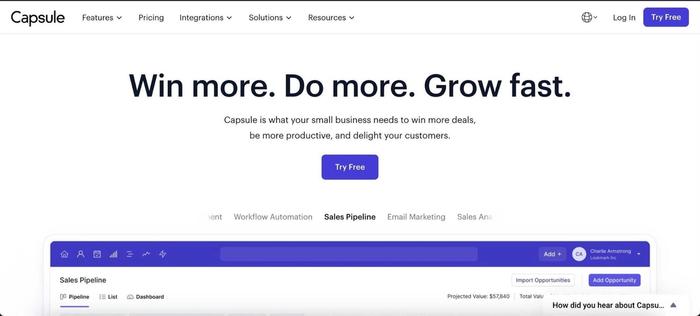
A full-cycle CRM that helps your sales teams manage all their accounts in one place. With Capsule CRM, you can make their lives easier with tools for outreach, follow-up, closing, and post-sales support. This CRM for HR also provides tools for evaluating your sales reps and their performance in real time. The best part is that Capsule is free to try.
Betterworks
A simple tool for goal setting, tracking, real-time performance management, and setting OKRs and SMART goals. Pricing is available upon request.
Weekdone
An OKR and goal-tracking tool with weekly and monthly check-ins. It offers excellent dashboards for tracking team progress Weekdone's user-friendly interface and customizable features easily adapt to your team's requirements. Pricing starts at $108 per month.
Workboard
A strategy execution platform with OKR management, real-time tracking, automated reports, and advanced analytics. Workboard's robust analytics capabilities provide actionable insights into your team's performance. Pricing is available upon request.
360-degree feedback tools
360-degree feedback apps gather feedback from multiple sources (peers, supervisors, stakeholders, as well as independent reports) to give a well-rounded view of employee performance.
Best examples of performance management software in this category include:
Qualtrics 360
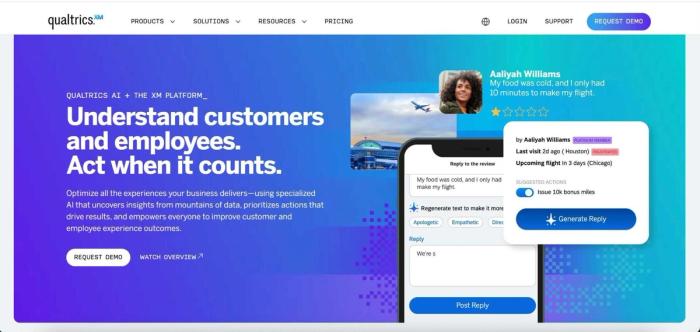
Qualtrics is a performance management solution for collecting and analyzing 360-degree feedback. It allows you to run employee surveys and question sets and view real-time reports on employee performance reviews. Qualtrics does not have publicly available pricing.
Leapsome
Leapsome is a talent management platform that offers continuous feedback features and learning modules to support employee development. It enables managers to align employee goals with business objectives through ongoing feedback and development tracking. Pricing for Leapsome is available upon request.
Spidergap
Spidergap allows HR teams to run 360-degree feedback cycles, offering customizable surveys and performance reports that help employees clearly understand their strengths and growth areas. It is one of the best and most comprehensive feedback platforms on the market. The price starts at $989 per year.
Employee engagement tools
A good employee engagement tool goes beyond just making your employees happy. Tools help you increase workplace motivation, satisfaction, and commitment – all contributing to positive and productive results.
Workleap Officevibe
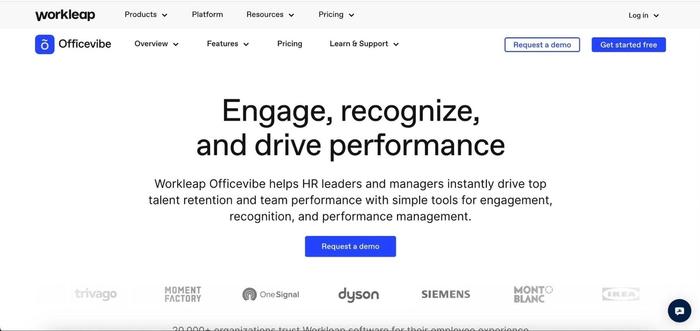
Workleap offers weekly pulse surveys, anonymous feedback channels, customizable templates, and in-depth engagement analytics. Workleap Officevibe provides managers with real-time employee engagement data, allowing them to track trends and address engagement gaps. Pricing starts at $3.50 per user per month.
Cultureamp
Cultureamp is another employee experience platform that offers clear insights into employee engagement. Cultureamp offers engagement heatmaps, enabling leaders to pinpoint specific areas of the company needing improvement and take action based on data-driven insights. To get pricing information, contact their sales team.
TINYpulse
TINYpulse allows companies to retain top talent by collecting anonymous feedback and pulse survey insights, helping leaders make timely improvements that resonate with their teams. For pricing information, contact their sales team.
Learning and development tools
Investing in your employees' growth is an investment in your organization's future. Learning and development tools (e.g., those with personal development plans) provide the resources and platforms to cultivate talent, enhance skills, and drive innovation.
LinkedIn Learning
LinkedIn Learning empowers employees to develop relevant skills through on-demand courses, allowing managers to set up tailored learning paths that support individual and team objectives.
Prices start at $20 monthly.
Docebo
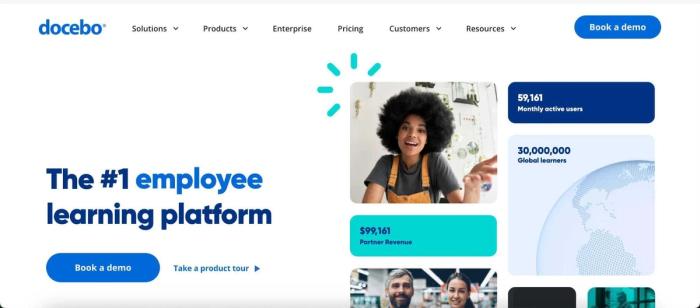
An AI-powered platform that combines online and offline learning. With Docebo, you can create tailored learning paths based on employee preferences, goals, and roles. As of yet, no pricing information has been released.
Cornerstone OnDemand
Cornerstone OnDemand’s compliance and skill development modules help managers track employee upskilling efforts and maintain regulatory standards. They also integrate with broader HR systems.
Employee performance appraisal tools
Do you want to evaluate your team's contributions fairly AND systematically? You need employee performance appraisal tools for that.
These tools transform how you measure and value your team’s impact. Employee appraisal tools can provide crystal-clear insights into progress, feedback, and performance goals. No more vague evaluations – just data-backed decisions on raises, promotions, and development.
These tools are excellent choices for employee performance appraisal:
Lattice
Lattice enables organizations to run structured performance review cycles and track individual goals, providing managers with a clear, comprehensive view of team performance.
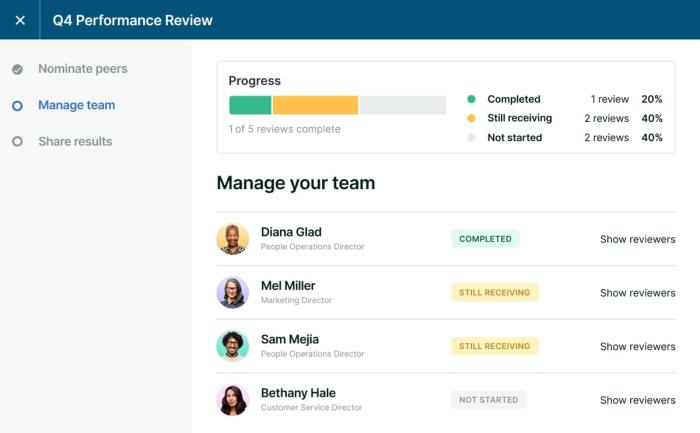
Feature-based pricing starts at $5 per user per month.
Trakstar
Trakstar streamlines performance evaluations with customizable review templates and automated reminders, helping managers maintain consistent and timely feedback processes.
They can also create personalized appraisal forms and set automated reminders for evaluation. There's no publicly available pricing, so reach out for a quote.
BambooHR
BambooHR’s integrated performance appraisal tools allow managers to conduct self-assessments, peer reviews, and goal tracking in one platform, simplifying the performance review process. Pricing is available upon request.
What performance management tool will you consider?
Tracking performance doesn’t have to mean more work – performance management tools optimize this process and show employees you’re invested in their growth.
For sales teams, Capsule CRM organizes customer data, letting your team focus on selling instead of wrestling with tools.
Try Capsule free and see the impact on your team’s performance and business success!




